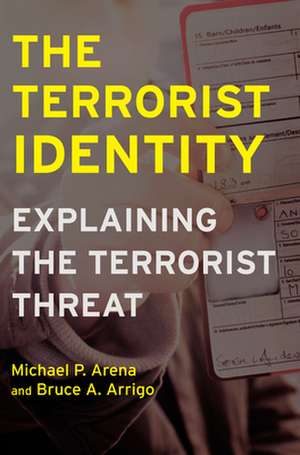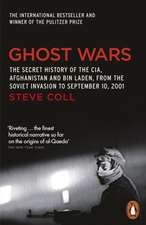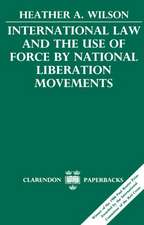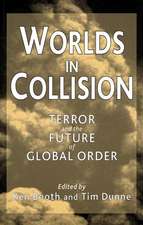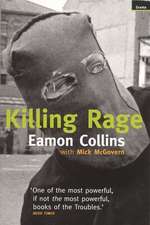The Terrorist Identity – Explaining the Terrorist Threat: Alternative Criminology
Autor Michael P. Arena, Bruce A. Arrigoen Limba Engleză Paperback – 31 oct 2006
| Toate formatele și edițiile | Preț | Express |
|---|---|---|
| Paperback (1) | 242.60 lei 6-8 săpt. | |
| MI – New York University – 31 oct 2006 | 242.60 lei 6-8 săpt. | |
| Hardback (1) | 527.06 lei 6-8 săpt. | |
| MI – New York University – 31 oct 2006 | 527.06 lei 6-8 săpt. |
Din seria Alternative Criminology
-
 Preț: 173.10 lei
Preț: 173.10 lei -
 Preț: 199.72 lei
Preț: 199.72 lei -
 Preț: 216.58 lei
Preț: 216.58 lei -
 Preț: 216.70 lei
Preț: 216.70 lei -
 Preț: 215.87 lei
Preț: 215.87 lei -
 Preț: 200.81 lei
Preț: 200.81 lei -
 Preț: 231.78 lei
Preț: 231.78 lei -
 Preț: 226.46 lei
Preț: 226.46 lei -
 Preț: 242.78 lei
Preț: 242.78 lei -
 Preț: 207.27 lei
Preț: 207.27 lei -
 Preț: 240.87 lei
Preț: 240.87 lei -
 Preț: 228.59 lei
Preț: 228.59 lei -
 Preț: 225.87 lei
Preț: 225.87 lei -
 Preț: 241.64 lei
Preț: 241.64 lei -
 Preț: 210.54 lei
Preț: 210.54 lei -
 Preț: 225.49 lei
Preț: 225.49 lei -
 Preț: 222.81 lei
Preț: 222.81 lei -
 Preț: 223.80 lei
Preț: 223.80 lei -
 Preț: 226.67 lei
Preț: 226.67 lei -
 Preț: 244.35 lei
Preț: 244.35 lei -
 Preț: 232.23 lei
Preț: 232.23 lei -
 Preț: 229.55 lei
Preț: 229.55 lei -
 Preț: 242.01 lei
Preț: 242.01 lei -
 Preț: 241.64 lei
Preț: 241.64 lei -
 Preț: 243.58 lei
Preț: 243.58 lei -
 Preț: 239.73 lei
Preț: 239.73 lei -
 Preț: 230.50 lei
Preț: 230.50 lei
Preț: 242.60 lei
Nou
Puncte Express: 364
Preț estimativ în valută:
46.42€ • 48.47$ • 38.33£
46.42€ • 48.47$ • 38.33£
Carte tipărită la comandă
Livrare economică 15-29 aprilie
Preluare comenzi: 021 569.72.76
Specificații
ISBN-13: 9780814707166
ISBN-10: 0814707165
Pagini: 301
Dimensiuni: 152 x 229 x 17 mm
Greutate: 0.43 kg
Editura: MI – New York University
Seria Alternative Criminology
ISBN-10: 0814707165
Pagini: 301
Dimensiuni: 152 x 229 x 17 mm
Greutate: 0.43 kg
Editura: MI – New York University
Seria Alternative Criminology
Cuprins
AcknowledgmentsPart I 1 Introduction; 2 The Psychology of Terrorism; 3 The Sociology of IdentityPart II4 An Overview of Five Extremist Organizations; 5 The Provisional Irish Republican Army; 6 The Islamic Resistance Movement (Hamas); 7 The Peruvian Shining Path; 8 The Liberation Tigers of Tamil Eelam; 9 Racist SkinheadsPart III10 ConclusionNotes; References; Index; About the Author
Recenzii
"The authors argue that terrorists can be better understood using the growing body of research known as the sociology of terrorism and, in particular, through the lens of structural symbolic interactionism, which explains aggression by focusing on how group identity is formed at the individual level." Brian Forst, Theoretical Criminology"The interpretive framework presented offers students of political violence a highly accessible template from which to study the socio-psychological reasons individuals are drawn into terrorist groups, and how the groups themselves act to reinforce the identities of their members....The authors are to be commended for producing a model with such tremendous analytical clarity and pedagogical utility." Choice"Arena and Arrigo give us a brilliant glimpse into the 'terrorist' psyche as they detail the creation and maintenance of identity in various terrorist organizations. Their conceptual framework has important implications for law enforcement, public policy makers, and academic researchers engaged in the study of terrorism." Lynne Snowden, co-author of Collective Violence"The overall quality of this book is astonishing, the ease of reading and the depth of theoretical knowledge, equally impressive. It is a valuable contribution to the terrorism literature and of such quality that it will be quoted, used, debated, and confronted by researchers for years to come. This book represents a vanguard of sociological thought on this subject and is a much needed voice in the debates on terrorism." James David Ballard, author of Terrorism, Media, And Public Policy: The Oklahoma City Bombing
Notă biografică
Descriere
Explains how violent and extremist collective behaviour emerges culturally, how it informs the identity of group members socially, and how participants assume their place in these groups completely even at the expense of life-threatening harm to others or to themselves
